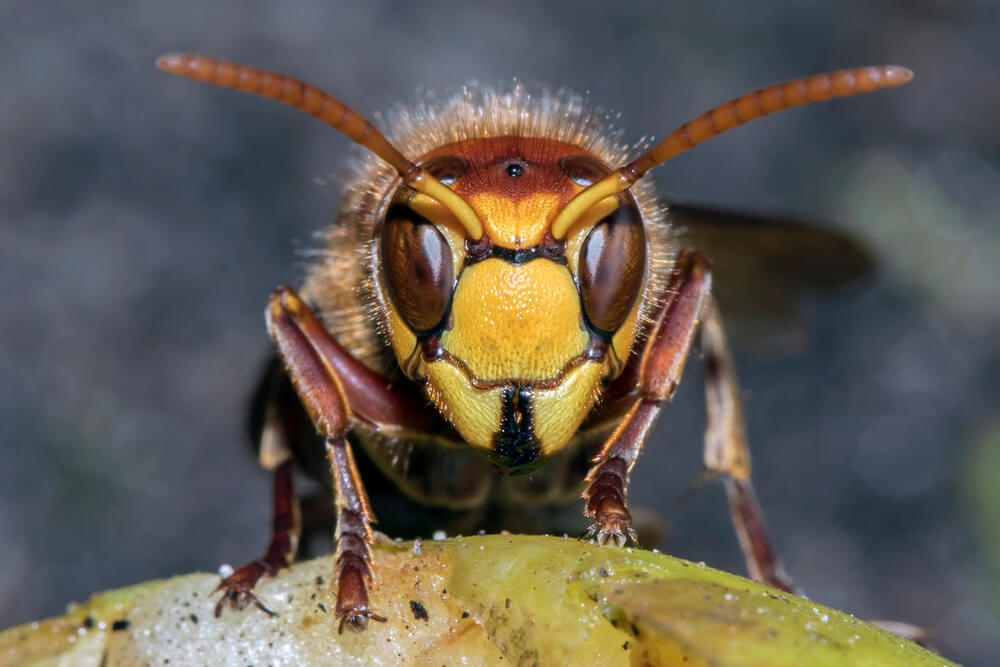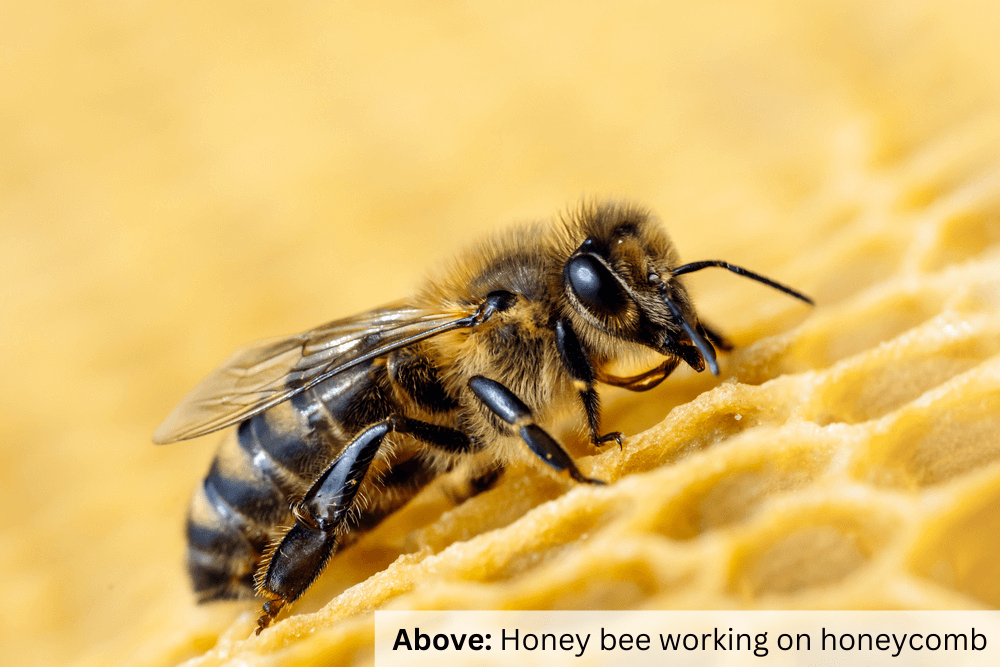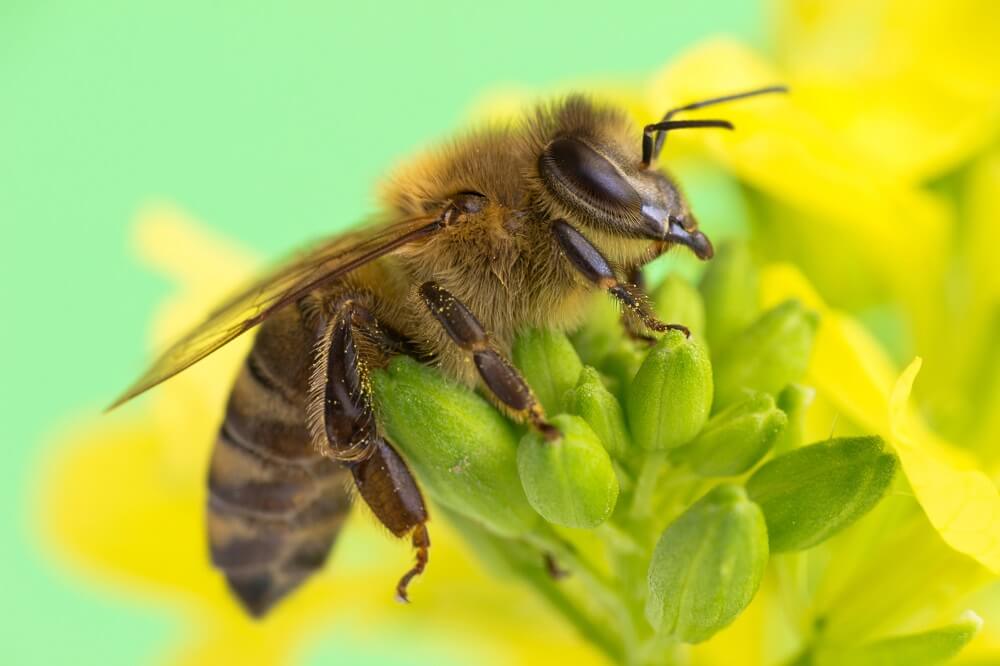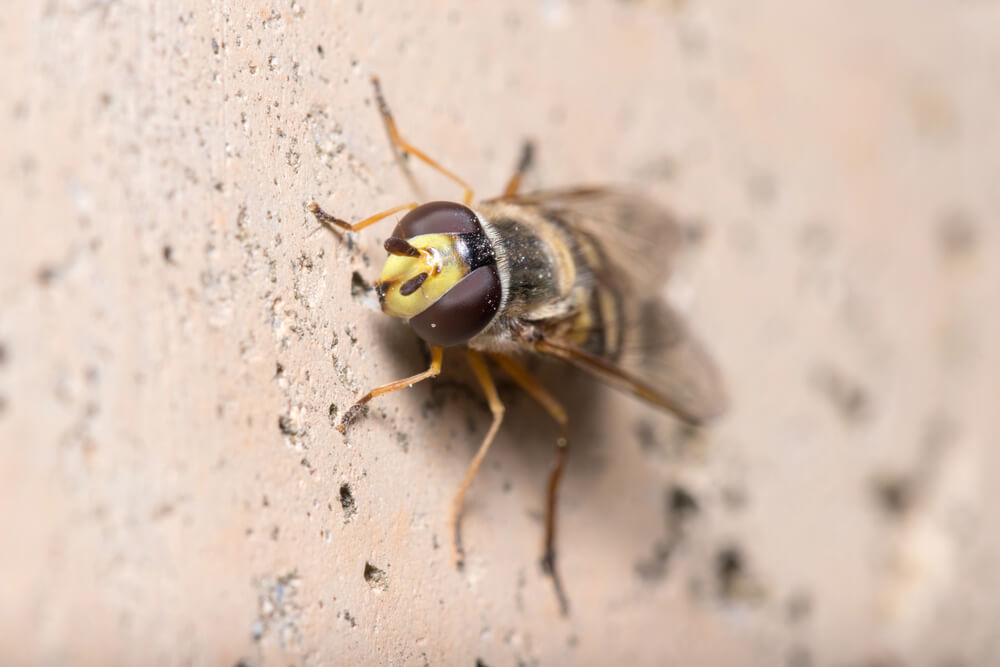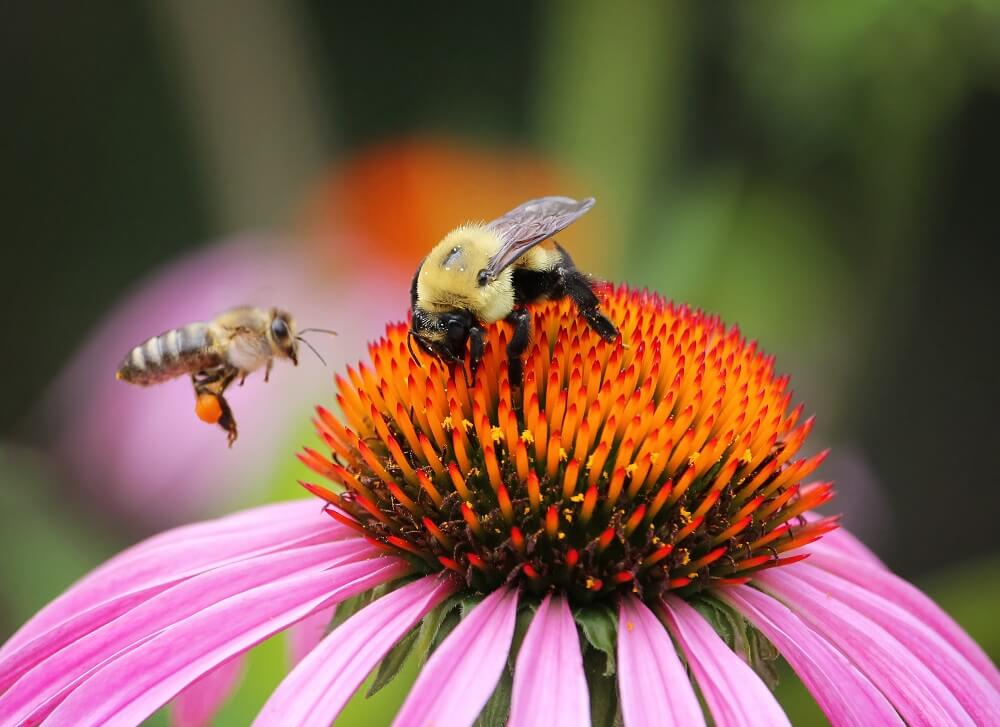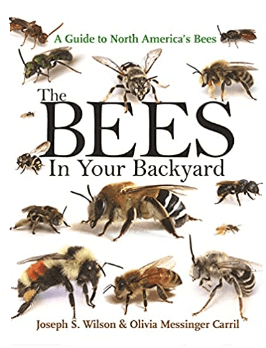Table of Contents:
Do Hornets Pollinate?
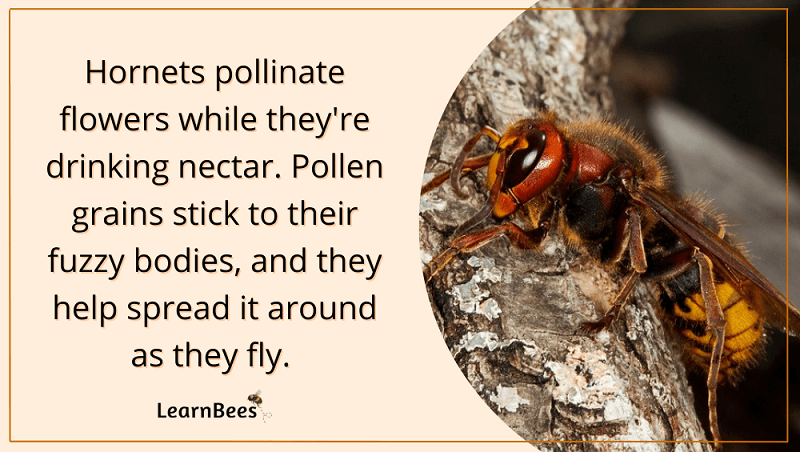
Hornets are crucial pollinators that are necessary to their native ecosystems. Hornets are native to places like Asia and Europe. However, they’re not native to North America.
Now here’s something most people don’t realize:
Hornets pollinate the same way bees do.
Like bees, hornets collect pollen on their fuzzy bodies while drinking flower nectar. As the hornet flies between flowers, some of the pollen grains falls off each time. This process is called pollination, and it helps plants produce seeds.
Now I know what you might be saying…
Wait, hornets have fuzzy bodies like bees do?
Yes, hornets have body hair despite appearing hairless and shiny at first glance. When you look at hornets under a magnifying glass, dozens of tiny hairs will be revealed.
More importantly?
These small but mighty hairs allow hornets to pollinate thousands of plant species worldwide.
Now I should give you a warning.
Some people claim that hornets don’t pollinate. However, these people aren’t well-informed. This assumption usually comes from people not realizing that hornets also have fuzzy bodies like bees.
Hornets, wasps, and bees are all closely related. In fact, many entomologists (insect scientists) consider them to be “cousins.” It’s not unusual to see these insect cousins pollinating flowers beside each other.
Are Hornets Good to Have Around?
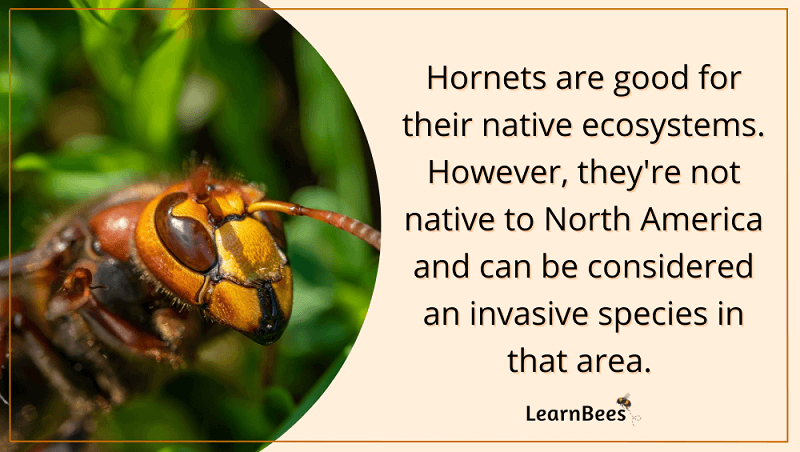
Hornets are good to have around in areas where they’re native.
For example, the European hornet (Vespa crabro) is considered a beneficial insect in Europe. It preys on common pests that harm food crops, such as beetle larvae, cabbage worms, and aphids.
But here’s the thing:
Hornets are not native to North America.
Unfortunately, the European hornet was first brought to the United States in the 1800s. Since then, it’s spread to over 30 states.
The Asian giant hornet (Vespa mandarinia) was also discovered in the United States in 2019. There have been efforts to eradicate these hornets to prevent their spread.
Asian giant hornets prey on our beneficial native insects, such as bees, wasps, and caterpillars.
Hornets also compete with native insects for food. Introducing non-native bugs and plants has led to a decline in our native bug populations.
Take bumble bees, for example.
The American bumble bee (Bombus pensylvanicus) has declined nearly 90% over the past few decades. This humble bee was once found all over the United States but has now vanished from at least 16 states.
The reason?
These bumble bees have faced intense food competition from non-native insects, including honey bees and hornets. Additionally, introducing non-native plants, pesticides, and habitat loss have all significantly affected their decline.
Not good.
Do Hornets Pollinate as Much as Bees?
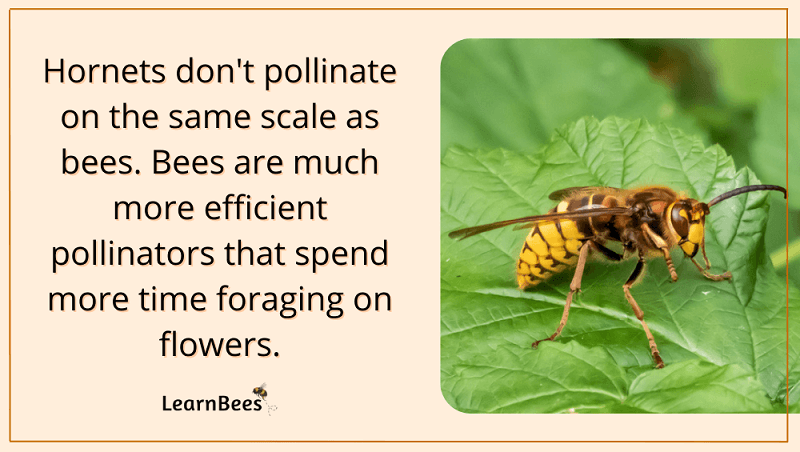
The research comparing bee pollination to hornet pollination is limited. Fortunately, this is gradually shifting as researchers continue to study hornets.
With that said:
Bees are generally coated with more body hair than hornets. As such, this leads entomologists to conclude that bees are more efficient pollinators than hornets.
For example, let’s look at bumble bees again.
There’s a clear difference between a bumble bee’s body hair and a hornet’s body hair.
It’s easy to notice that bumble bees are covered in a thick layer of body hair. You don’t need a magnifying glass to see this. This means that bumble bees can collect more pollen grains on their bodies than hornets do.
Bumble bees also have generalist feeding habits, meaning they pollinate various flowers.
Better yet?
Bees also typically spend more time foraging on flowers than hornets do. This is because bees are vegetarians that get their food source from flowers. Pollen provides them with protein, and nectar gives them carbohydrates.
On the other hand, hornets are omnivores that eat both nectar from flowers and other insects. This means they don’t need to spend as much time on flowers because it isn’t their sole food source.
In summary:
While hornets help with pollination, bees are generally considered more efficient pollinators than hornets.
However, hornets excel in pest control of bugs that damage food crops. Meanwhile, bees are considered vegetarian because they don’t eat other insects.
FAQs on “Do Hornets Pollinate?”
- Are hornets good for the garden?
- Should you leave hornets alone?
- Are hornets pollinators or predators?
- Does the ecosystem need hornets?
- What is the point of a hornet?
- Do wasps or hornets pollinate?
- Are all hornets pollinators?
Are hornets good for the garden?
Hornets are good for the garden in areas where they’re native.
For instance, the hornets seen in the United States aren’t native to North America. The European hornet was introduced to the United States in the 1800s and has since spread throughout the country.
European hornets help manage bug populations in Europe. However, in the United States, they’re known for eating beneficial insects that are native, such as bees, caterpillars, and wasps.
In 2019, another hornet species was found in the US. This species is known as the Asian giant hornet and is considered invasive. It can damage our native bug populations.
So, while hornets can be beneficial in certain areas, it’s important to note that they should be in places where they’re native.
Think about it this way.
Certain non-native plant species can become invasive once brought to another country. Soon, such plants can dominate a local habitat by overtaking beneficial, native plants. The same goes for animals.
Hornets have an advantage over many insects due to their large size and painful sting. European hornets can be up to 1.5 inches long, over twice the size of some bees. This gives them a physical advantage over other insects.
—> Go back to the FAQs on “Do Hornets Pollinate?”
More to Explore:
Should you leave hornets alone?
“Should you get rid of hornets that pollinate?” is a common question.
The answer is that hornets should be left alone in areas to which they belong. For instance, Asian giant hornets are native to Asia and essential to the ecosystem. It’s best to leave the insects alone as long as they’re native.
But there are no hornets that are native to the US.
With that said, European hornets were brought to North America in the 1800s and have spread throughout the area. They’re most commonly found in the Eastern United States.
If you see hornets in your yard, then you can take steps to remove them. European hornets are social insects that live in colonies with other hornets. The queen hornets emerge from hibernation in the spring and begin laying eggs to build their colony.
If the hornet nest is large, contacting a local pest control company is best to remove it. This is especially important if the nest is in a high-traffic location near people, children, or animals.
Hornets are large stinging insects that can deliver painful stings. Being stung by multiple hornets can be life-threatening to people suffering from anaphylaxis. Additionally, multiple stings can be harmful to small pets and children especially.
Overall, it’s best to leave hornets alone in areas where they naturally occur. However, you can remove hornets if you live in a country where they’re non-native, such as the United States.
—> Go back to the FAQs on “Do Hornets Pollinate?”
More to Explore:
Are hornets pollinators or predators?
Hornets are both pollinators and predators.
Hornets collect pollen from flowers like other pollinators, such as bees and butterflies. They also feed on nectar and help to spread the pollen when they move from one flower to another.
However, hornets are also predators that feed on other insects. They hunt for spiders and worms, as well as other flying insects.
Therefore, hornets are beneficial for pollinating plants and managing other insect populations. Hornets are particularly beneficial in the places where they’re native.
—> Go back to the FAQs on “Do Hornets Pollinate?”
More to Explore:
- What’s the Difference Between Wasps, Hornets, and Bees?
- Wasp Nest vs. Bee Nest: Which One Is It?
- Wasps vs. Honey Bees: Are They Different?
Does the ecosystem need hornets?
Yes, the ecosystem needs hornets. That said, hornets are beneficial in countries where they are native. Hornets aren’t native to the United States, for example, so they’re not considered beneficial insects here.
The United States is equipped with its own beneficial wasps, such as yellowjackets. Like hornets, yellowjackets help kill off bugs that can potentially harm food crops. The main difference between yellowjackets and hornets is that yellowjackets are native to the US.
As a result, yellowjackets are valuable parts of North American ecosystems.
Hornets are also valuable to ecosystems in which they’re native. They’re important pollinators that help spread pollen between plants. This allows the plants to reproduce and continue their species.
Hornets also feed on a variety of insects that can be damaging to crops and gardens. They hunt for grasshoppers, flies, wasps, and other bugs that eat away valuable foliage or prey on beneficial insects.
So, hornets should stay in areas where they naturally occur because this is where they’re the most beneficial. Hornets should be carefully managed in areas where they’re non-native. This helps prevent the disturbance to the natural balance of insect populations in a particular area.
—> Go back to the FAQs on “Do Hornets Pollinate?”
More to Explore:
What is the point of a hornet? Do hornets serve any purpose?
Hornets serve two valuable purposes: pollination and pest control.
But remember:
Hornets are crucial in areas that they are native to. Hornets shouldn’t be brought into areas where they don’t naturally occur.
As pollinators, hornets help spread pollen between plants. This allows the plants to make seeds that produce more plants. Pollination is important for the survival of most plants.
Not only are hornets pollinators, but they can also be incredibly helpful because of their appetite for various bugs. They hunt down grasshoppers, flies, wasps, and other potentially damaging insects that may harm crops or gardens. This helps maintain the natural balance of insect populations in a particular area.
In summary, hornets play a significant role in their native ecosystems and should be left alone to thrive. On the other hand, it is critical to manage populations of non-native hornets so they don’t overtake the habitat.
—> Go back to the FAQs on “Do Hornets Pollinate?”
More to Explore:
Do wasps or hornets pollinate?
Both wasps and hornets pollinate.
“Do hornets pollinate flowers like bees?” is a common question.
The answer is yes. Hornets collect pollen like bees and other pollinators such as butterflies. They help spread the pollen from one flower to another.
However, it’s important to note that bees are much more efficient pollinators. For one, they spend more time foraging on flowers. Secondly, they have fuzzier bodies that allow them to collect more pollen.
That said, hornets still play a role in pollination – even if it’s not on the same scale as bees.
Wasps also play a role in pollinating flowers. As they search for nectar, they inadvertently pick up and spread pollen when moving between flowers. Wasps are essential pollinators of some species of plants, like fig trees.
So, both wasps and hornets are important pollinators in their native ecosystems. They contribute to the pollination of plants, which is essential for the survival and growth of plant species. Therefore, it’s best to leave these beneficial insects alone in areas where they’re native, so that they can thrive and continue to play an important role.
—> Go back to the FAQs on “Do Hornets Pollinate?”
More to Explore:
Are all hornets pollinators?
As far as we know, all hornets are considered pollinators.
